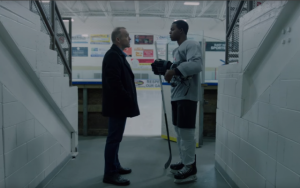Director X (real name Julien Christian Lutz) has captured some of hip-hop’s most iconic images on film. His Hotline Bling music video for Drake racked up almost 300 million online views, and he’s directed promos for everyone from Rihanna and Kendrick Lamar to Iggy Azalea to Busta Rhymes, but now that he’s made the leap to the movies don’t expect a big screen musical from him.
“I’ve lived my life for almost 20 years with guys rapping or singing or singers who wish they were rappers,” he says.
“I’ve swum in those waters enough. Now that I’ve got people talking I don’t want them to talk about rapping and singing. Forgive me if that is not something I’m into right now.
“Maybe when I’m an old man doing a period piece about this time it might be interesting but I’ve always felt hip hop is like a movie right in front of your face. Chris Brown and Drake really got into a fight at a bar and threw vodka bottles at one another. Me fictionalizing a movie of that [isn’t necessary], you’re watching the movie unfold in front of your face, bullet time. For someone else, go on ahead, but there are other stories I’d like to tell and speak in my own voice.”
Over the years Director X has been connected to other projects — there were rumours he would direct a vampire film called Razorwire — but says he chose Across the Line as his debut feature film because “it was actually about something.”
“It’s about where I’m from,” he says. “It’s about Canada but a deeper level of Canadian history and Canadian communities. It’s not just a story about Toronto or a story we know, regardless of the city.”
Inspired by true events, the film is a study of race in small-town Nova Scotia as seen from the perspective of a young National Hockey League prospect. When his chance at the big league is threatened by family problems and racial tension at his high school, he must overcome intolerance, cultural tension and the odds to fulfil his dream.
“It’s a story that needed to be told,” says the director, whose next film is a sequel to the movie Center Stage.
Director X’s music video work is characterized by his own particular sense of style, something he had to put on the back burner while making Across the Line.
“I brought myself to it but at the same time there aren’t any scenes that are just pure visual fun,” he says. “There was no John Woo cool. When you’re making movies you have a responsibility to respect the story over cool awesome shots that belong in blockbusters as opposed to a narrative. But at the same time it’s not just turning on the lights and putting the camera on a tripod. It’s finding a style that aids the story as opposed to just something that is cool stuff.”
Across the Line’s story has already connected with festival audiences. It won Best Atlantic Feature at the Atlantic Film Festival and earned kind reviews at the Beverly Hills and Boston International Film Festivals, which he thinks are driven by the realism on the screen.
“It’s inspired by life,” he says, “and takes turns that only come out of life.”
 Richard joins CTV News at Noon anchor Ken Shaw to talk about the Grammy nominations and who might possibly take over for Kevin Hart at the Oscars.
Richard joins CTV News at Noon anchor Ken Shaw to talk about the Grammy nominations and who might possibly take over for Kevin Hart at the Oscars.
